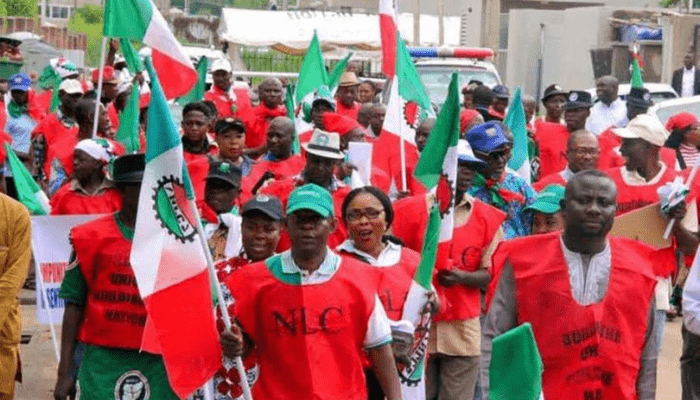The Nigerian Labour Congress, NLC, and the Trade Union Congress, TUC, on Friday, asked the National Industrial Court, NIC, sitting in Abuja, to vacate its interim order that stopped them from embarking on a strike action to protest the unilateral removal of fuel subsidy by the Federal Government.
The two unions, in a motion they filed through their lawyer, Mr Femi Falana, SAN, maintained that the suit FG brought against them before the NIC, was offensive to provisions of Section 254C (1) (f) of the 1999 Constitution and section 7(6) of the NIC Act 2006, “and thus, the ex-parte order liable to be set aside.”
Both the NLC and the TUC argued that the court lacked the jurisdictional competence to hear and determine the case “as it was filed in violation of Section 17 {2} of the Trade Disputes Act, which authorises the Minister of Labour and Employment to refer a trade dispute directly to the National Industrial Court.”
“This court as presently constituted lacks the jurisdictional competence to hear and determine the matter and or make any orders as regards the trade Dispute {subject matter of this suit} for failure to first refer the trade dispute to the Industrial Arbitration Panel as mandated by part 1 of TDA.
“The Claimants/Applicants suit offends the lucid provisions of Order 3 Rules 1 and 6 of the National Industrial Court Civil Procedure Rules, 2017.
“The Defendants/Applicants and their members have a right to strike under the Trade Unions Act, the Trade Disputes Act, the ILO Convention and under several international treaties the 1st Claimant/Applicant is a signatory to.
“By virtue of Section 40 of the Constitution of the Federal Republic of Nigeria, 1999 as amended, Nigerian workers have the fundamental right to protest against policies of government considered inimical to their interests as reiterated in the cases of IGP VS ANPP {2008} 12 WRN 65, MUSA VS INEC,” they added.
Besides, NLC and TUC contended that the suit by FG did not disclose a reasonable cause of action against them.
“The Plaintiff’s suit is lacking in bona fide, as it was filed to harass, irritate and embarrass the Defendants/Applicants, which constitutes an abuse of judicial process.
“The Claimants/Applicants suppressed material facts before this Honourable Court thereby misleading the Court to grant the exparte reliefs sought and obtained.
“In the circumstances and under established judicial authorities as well as extant Rules of this Honourable Court, the Claimants suit as presently constituted against the Defendant is liable to be dismissed or struck out for want of jurisdiction and the ex parte order set aside,” the two unions added.
Consequently, they applied for an order, “setting aside, discharging and/or vacating the ex parte interim order of injunction restraining the Defendants/Respondents, their members, their agents, employees, workmen, servants, proxies or affiliates from embarking on the planned Industrial Action and/or strike of any nature pending the hearing and determination of the Claimants/Applicants motion on notice for an interlocutory injunction made on the 5th June 2023, Coram: Hon. Justice O.Y. Anuwe in Suit No: NICN/ABJ/158/2023 between the federal government of Nigeria & anor. Vs Nigerian labour congress and anor.”
It will be recalled that the court had in a ruling that was delivered by Justice O. Y. Anuwe on June 5, barred the two organizations from proceeding with their planned strike action, pending the determination of a suit that was brought against them by FG.
The court held that the interim order, as well as substantive suit, should be immediately served on both groups, which were cited as Defendants/Respondents in the suit, even as it adjourned further proceedings in the matter till June 19.
The court order followed an ex-parte application that FG filed through the Federal Ministry of Justice.
FG’s lawyer, Mrs Maimuna Lami Shiru, who moved the application, had insisted that the proposed strike action was capable of disrupting economic activities, the health sector and the educational sector.
FG further tendered Exhibits FGN 1, 2 and 3, which were notices from the NLC, TUC and the Nigerian Union of Journalists, NUJ, to their members, asking them to withdraw their services with effect from Wednesday, June 7.
The court, in its ruling, held that it was empowered by section 7(b) of the NIC Act, 2006, with the exclusive jurisdiction in matters relating to the grant of any order to restrain any person or body from taking part in any strike, lockout or any industrial action.
It held that sections 16 and 19(a) of the NIC Act 2006, also empowered it to grant urgent interim reliefs.
The court held that the affidavit of urgency as well as the submission of FG’s lawyer revealed: “a scenario that may gravely affect the larger society and the well-being of the nation at large”.








